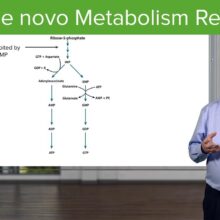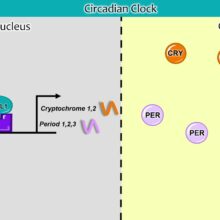Water Regulation by Antidiuretic Hormone (ADH)
Water Regulation by Antidiuretic Hormone (ADH)/ Antidiuretic Hormone animation/Antidiuretic Hormone mechanism/Antidiuretic Hormone physiology/Antidiuretic Hormone function
The hypothalamus produces a polypeptide hormone known as antidiuretic hormone (ADH), which is transported to and released from the posterior pituitary gland. The principal action of ADH is to regulate the amount of water excreted by the kidneys. As ADH (which is also known as vasopressin) causes direct water reabsorption from the kidney tubules, salts and wastes are concentrated in what will eventually be excreted as urine. The hypothalamus controls the mechanisms of ADH secretion, either by regulating blood volume or the concentration of water in the blood. Dehydration or physiological stress can cause an increase of osmolarity above 300 mOsm/L, which in turn, raises ADH secretion and water will be retained, causing an increase in blood pressure. ADH travels in the bloodstream to the kidneys. Once at the kidneys, ADH changes the kidneys to become more permeable to water by temporarily inserting water channels, aquaporins, into the kidney tubules. Water moves out of the kidney tubules through the aquaporins, reducing urine volume. The water is reabsorbed into the capillaries lowering blood osmolarity back toward normal. As blood osmolarity decreases, a negative feedback mechanism reduces osmoreceptor activity in the hypothalamus, and ADH secretion is reduced. ADH release can be reduced by certain substances, including alcohol, which can cause increased urine production and dehydration.
[ad_2]
Source link





explanation is good, prononciation is not
Thank u so much.
it was very helpful
So well explained
This was so informative
Finally I got to understand the secret need and uses of ADH……..thank you very much
Hindi me samjhaye sir
Living with a virus for eternity is something you need to sit down and think. There is a cure for any type of virus and diseases. So why listen to people who will discourage you and not give you a cure. Alternative cure for any type of virus, diseases and STDs available by Dr Brown
1; HSV1 and HSV2
2; Lupus diseases
3; Cancer
4; Human Papilloma virus (HPV)
5; Crohn's diseases
6; Diabetes
7; Sickle Cell Arnamia
8; Herpes
9; HIV
10;Hepatitis
11;Diabetes
12;Pile
for any health Contact Dr Brown for help in ridding out your problem. WhatsApp +2348105207227 or contact him through his Email:
askdrbrownchannel@gmail.com
Thank u very much for this amazing explanation 🌷
Thank u uuuuuuùuu
Sooooo perfect thank u
Amazing 👌
Splendid
👍clearly explained
Wow I’m impressed.. thank you 🙏
Thanku sir
Thank you!! 😗
Winner of a video, I been tryin to find out about "does kidney stones cause shortness of breath?" for a while now, and I think this has helped. Have you heard people talk about – Pemotah Intellective Primacy – (do a google search ) ? It is a good exclusive product for discovering how to get rid of your kidney disease minus the hard work. Ive heard some super things about it and my work buddy got amazing success with it.
Decreased osmolarity and hypovolemia. Would you see:
A) decreased urine output
B) decreased ADH secretion
C) increased urine output
Can anyone give me ans of this question with explanation?
Thanks 😊
This video is very good in understanding ADH, the antidiuretic hormone. I am very glad this comes with subtitles because the instructor has a very strong accent that is hard to understand, also some of the subtitles are incorrect but I figured it out. Putting that aside. He explains it in such a reasonable and comprehensive way that one must understand. This video is the best thus far…even a layperson can get it. I will continue to view this video so I can totally get the picture of how this works.
Love this video!! Saved me for me monthly exam ❤️biology
I have had water retention because of being overweight. But i went on OMAD and vegetarian diet and managed to reduce 10 kg in 2.5 months. But lately for the past 3 days , i have been urinating frquently, nearly 3-4 times in 4 hours. Usually i will urinate only like 1-3 times a day. is my body getting rid of water through urination? Or is some health issue. My legs are not swollen anymore. The anlkes and feet are back to normal. Is there anything for me worry about, my kidney function test were all nominal. there were no protein, glucose or ketone traces.
great Ilustration !
Can you put subtitles up? the auto generated ones do not pickup on your accent either. Its upsetting because I could tell their was a lot of helpful information…….Its just I can only understand half of whatever your saying.
Good video sir..
Nice explanation
Best explain
Nice explanation
nice
You are amazing, Thank you!
The diagrams are very informative
Mujhe yeah problem he please treatment give me advice
Sir iska treat ment kya he
I watched Dr Najeeb's explanation of this right before coming here, and I couldn't help but notice all the similarities. Any chance you are/were a student of his?
Anyway great vid👍
Sir plz tell the treatment of diabetes insipidus..I am taking desmopressin 0.1 mg
dear sir.I have water loss thru urine.iam peing very clear water. if iam not drinking water then also I will pee a yellow colour.my urine gravity is 1.005.I have constipation and in digestion and weight loss.blood pressure varriying from very low to high. please tell me it is a sine of insipidus?
great😍
nice video
Thankyou sir
3:40
insipidus ka ilaz batao sir
You r awesome
Thank you for covering all the points👍
thankyou so much its help me alot
Great explanation thank you very much!
seems like this would have been a good video but i cant understand anything he is saying
is just me or does the pituitary gland looks like a nut sac
Really best animation. Loved it
thanks a lot the best video so far
😩😩😩so difficult terms
Very helpful